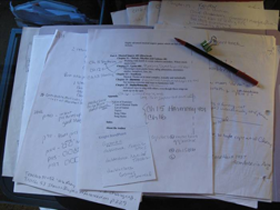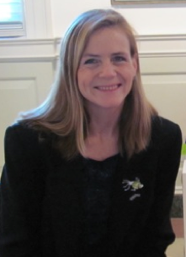In her new column The Write Way, Katie O'Sullivan discusses common editing errors that can send your writing directly into the slush pile.
If you have a question about writing or editing we'd love to hear it!
Please email your questions to Katie@CapeWomenOnline.com
COMMAS SAVE LIVES:
Why every writer needs an editor
by Katie O'Sullivan
Maybe you've seen one of the internet jokes about the importance of punctuation? For example, the one that compares "Let's eat, Grandma." to "Let's eat Grandma!"
The punchline: commas save lives.
Commas save manuscripts, too. Poor grammar, poor punctuation, and poor spelling are some of the most common reasons submissions are rejected by agents and editors. A form rejection letter will be the result, no matter how brilliant your storyline might ultimately be.
A first draft of any writing will always have mistakes. Once you've got your story on paper, it's well worth the time it takes to start at the beginning and go through a second and even third time, checking for grammar, punctuation and spelling errors.
"But my laptop has an automatic spell-check program," you might argue.
Never rely solely on your computer's intelligence. A machine doesn't care if you've used the wrong word, as long as it's spelled correctly. Maybe you heard about the problem with the 2010 cookbook, The Pasta Bible, by Silvio Rizzi and Tan Lee Leng? One of the recipes calls for "freshly ground black people" instead of "freshly ground black pepper."
They recalled the entire publication run and reprinted the book, as they needed more than a simple comma to save lives.
Computers are not infallible. They can't identify the correct usage for homonyms, such as their, they're and there. I know my spell-check program has a quirky penchant for putting an "apostrophe-s" after many words that I'm just trying to make plural, not possessive. I suspect my computer isn't the only one with this problem, judging by the number of times I've seen this mistake in print.
But editing is about more than commas and apostrophes. Yes, proper punctuation is important (especially to the Grandma in that internet joke) but editors also help an author shape and polish their story, making it the best it can be.
When you're writing a story, you know your characters in a way that no one else can. You understand them and hear their voices in your head. The trick to good writing is to bring these characters and their situations to life in the reader's head as well. This is where having an editor with a fresh pair of eyes can be invaluable.

Author Adriana Ryan agrees. Having recently signed her first book contract with Crescent Moon Press, she notes, "I was nervous about getting editorial feedback… However, my editor was able to give me much-needed development feedback as it related to the plot. I needed to add in more scenes with a particular character to make sure the conflict toward the end of the book was heightened. Without that feedback, my story would fall flat. I can see that now, but I was much too close to the story to see it initially."
Diane Haynes, author of the YA novel Rift Healer, also praises the process of working directly with an editor to polish her book.
She says, "after the process was finished, and all the changes made, I wondered what in the world the Acquisition Editor could possibly have seen in my book to make her offer me a contract. My book is good – everyone says so – but it's mostly due to the editor."
Working with an editor before you submit your manuscript can also be beneficial. Having a fresh perspective on your writing is always a good thing, and can give you a competitive edge in the submission process.
As the editor of this magazine, I work with many writers after they've submitted their stories for consideration. But I also work with authors who are in the process of writing their books.
A little over a year ago, a college friend approached me with an idea for a book she wanted to write, but knew she needed help. Nancy Howland Walker is an improv comedienne in Chicago, and has been teaching and performing for more than two decades. She wanted to get some of her teaching ideas down on paper to share, but wasn't sure she could write a whole book.
I agreed to help her, not to write the book but to edit her writing. As we went back and forth over the months, I realized how much I enjoy working with authors to help make their words and ideas sparkle. As much as I like writing, I really like editing.
According to my friend, I helped her immensely from start to finish. Her first book, Instant Songwriting, is currently available on Amazon from Satyagraha Publishing.
"I never understood all the authors gushing thanks to editors in their acknowledgment sections," said Nancy. "Then I wrote a book."
"Katie isn't just another pair of eyes. She's a pair of respectful, understanding, invaluable expert eyes who kept my style and intention, yet cleaned up the text so I didn't look like an idiot. Even the best of us get hung up on certain archaic grammar rules. (Really. Placing periods and commas when there are parentheses involved is complex and anti-intuitive!) I fully expect Katie to have my back and edit this quote so I seem smarter!"
This past spring, I started offering my editorial services outside of the magazine on a professional basis. I'm currently working with another Nancy, Wellfleet artist and author Nancy Nicol.
"Working on my first novel with Katie O'Sullivan as editor helps clarify my ideas," says Nancy Nicol. "Katie shows sincere interest each time we meet, and at the same time she keeps an objective viewpoint. She helps me find and fix mistakes in grammar and punctuation and suggests alternative wording with a professional touch, so that I feel encouraged to keep going."
If you have a manuscript or story you've been working on, consider working with an editor before you start to query agents or publishers. You want to polish your baby and make every word count before sending it off into the world.
And make sure the words on the page are the right ones, with the commas in the right places.
"Editors help pinpoint the little issues that have big results," says Kinley Baker, author of the Shadowed Love series. "They take what writers meant to say and make sure it's actually said."

Katie O'Sullivan is the editor of this magazine.
She is the author of two romantic suspense novels, and her third book, the young-adult novel SON OF A MERMAID, is due out in 2013 from Crescent Moon Press.
For more information about working with Katie to make your words sparkle on the page, email her at Katie@CapeWomenOnline.com
 |
